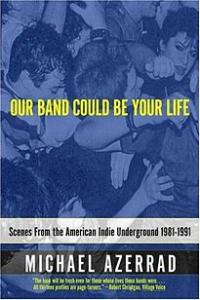After the breakup of the Sex Pistols, punk rock dropped off the mainstream radar. The "artists" who were drawn to the scene moved on to newer forms of music, exploring the experimental side of the spirit of `77. But underground, away from the mainstream's eye, a younger crowd was taking the aggression of punk rock and exploring it without influence from mainstream audiences. This crowd created a new breed of music that would slowly evolve and take on different influences to become an even more diverse scene than that of the original New York punk scene. Our Band Could be Your Life explores that scene, as it evolved from an offshoot of the punk scene, into the alternative rock scene that would take over the mainstream in the early nineties.
Our Band Could be Your Life appropriately takes its title from the lyrics of the Minutemen song, "History Lesson -- Part II." The song's sentiment seems to wrap up the sentiment of the book. This was music that anyone could make, but you had to be committed. None of the bands were made up of rock star types. They were all made up of men and women from all sorts of backgrounds and areas. But they worked hard, and laid down the foundation on which the modern American rock scene is based.
The book tells the story of 13 important rock bands: Black Flag, Minutemen, Mission of Burma, Minor Threat, Hüsker Dü, the Replacements, Sonic Youth, Butthole Surfers, Big Black, Dinosaur Jr., Fugazi, Mudhoney, and Beat Happening.
To go through a band-by-band detailing of the book would take up too much time. Some highlights include Black Flag's legal and financial struggles, Hüsker Dü's pranks on Minor Threat, Butthole Surfers' all-around drug-induced craziness and Steve Albini (of Big Black)'s dickishness.
In a more broad strokes view, the book breaks down the careers of these 13 bands and allows the reader to see how they functioned. From the interpersonal relationships (which are of particular interest in the Hüsker Dü and Dinosaur Jr. sections), to the difficulty of both growing artistically and giving the fans what they want, to the lifestyle that the music represented, to the struggle to find some sort of recognition (whether mainstream or otherwise) for the hard work put in to the music, the book covers a lot of what it meant to be in an independent band in the fledgling years of that scene.
The book does has some flaws. Mission of Burma's section is fairly anti-climactic and there is no real sense of conflict. Azerrad tends to focus too much on the individual band's specific influence on Nirvana, as well. Also, some fairly important albeit more mainstream bands (R.E.M. for instance) don't get recognized for their independent work.
But overall, this is an incredibly compelling work. The stories are inspiring. These bands didn't like the music scene around them, so they created their own. If you don't know these bands, the book will compel you to take a listen. And if you do know the bands, this book will give you the historical context to give you an even deeper understanding of the music. It's also worth it just to read about Gibby Haynes rubbing his dick on something that President Jimmy Carter touched.
